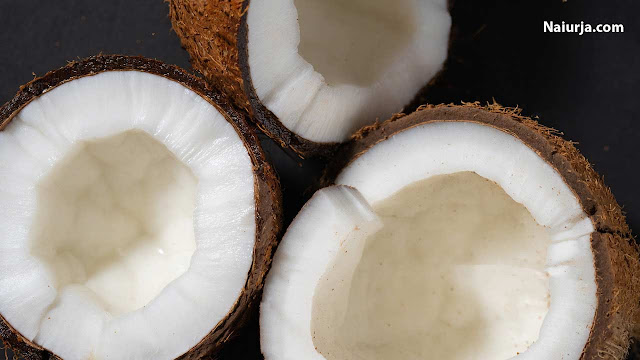Coconut
Coconut is a highly versatile and popular fruit that is well-known for its nutritional and culinary value. It is the fruit of the coconut palm (Cocos nucifera), which is a tropical plant that grows abundantly in countries such as the Philippines, Indonesia, Thailand, India, and many other parts of the world.
The coconut fruit is large and oval-shaped, with a hard, fibrous outer shell and a white, fleshy interior. The white flesh, known as the coconut meat, is edible and is used to make various dishes such as coconut milk, coconut cream, and coconut oil. The coconut water, which is found inside the fruit, is a refreshing and nutritious beverage that is also used in cooking.
Coconut is a rich source of nutrients, including vitamins, minerals, and fiber. It is especially high in medium-chain triglycerides (MCTs), which are a type of saturated fat that is easily metabolized by the body and is believed to have numerous health benefits. Some of the potential health benefits of coconut include improved digestion, increased energy, enhanced immunity, and improved heart health.
Coconut is also widely used in cooking and is a staple ingredient in many tropical cuisines. It is used to add flavor and texture to curries, stews, and soups, as well as in sweet dishes such as cakes, desserts, and candies. Coconut oil, which is extracted from the coconut meat, is a popular cooking oil that is widely used in many parts of the world.
Aside from its culinary and nutritional value, coconut has also been used for various other purposes. The coconut husk and shell are used to make various products such as ropes, mats, and furniture. Coconut oil is also used in cosmetics and skincare products due to its moisturizing and nourishing properties.
In conclusion, coconut is a highly versatile and nutritious fruit that has been used for various purposes for centuries. It is a staple ingredient in many cuisines and is renowned for its many health benefits. Whether you use it for cooking, skincare, or any other purpose, coconut is a valuable and highly versatile resource that is appreciated by many.
Read more :– Why men should not drink coconut water know its side effects and benefits
Know 7 side effects of papaya so that you are safe
What are the benefits of coconut
Coconut is a versatile fruit that offers a range of benefits. Here are some of the key benefits of coconut :-
- Nutritious :- Coconut is a good source of nutrients, including vitamins, minerals, and fiber. It is rich in manganese, which is important for healthy bones, and copper, which supports a healthy immune system.
- Heart health :- Coconut contains lauric acid, which has been shown to raise levels of HDL (“good”) cholesterol and improve heart health. It also has medium-chain triglycerides (MCTs), which are a type of fat that can boost metabolism and help with weight loss.
- Skin health :- Coconut oil is commonly used in skin care products because of its moisturizing and nourishing properties. It can help improve the skin’s hydration, reduce inflammation, and prevent infections.
- Digestive health :- Coconut has a high fiber content, which can help support digestive health and prevent constipation. It also contains antimicrobial properties that can help fight harmful bacteria in the gut.
- Brain function :- The MCTs in coconut oil can also provide a quick source of energy for the brain, potentially improving cognitive function and reducing the risk of neurological diseases.
- Anti-inflammatory :- Coconut contains antioxidants that can help reduce inflammation throughout the body, potentially reducing the risk of chronic diseases such as heart disease and cancer.
Overall, coconut offers a range of health benefits and can be a delicious and nutritious addition to your diet.
What are the side effects of coconut?
Coconut is generally safe for most people, and there are few reported side effects associated with its consumption. However, in some cases, people may experience adverse reactions to coconut products. Some potential side effects of coconut include :-
- Allergic reactions :- Coconut is a tree nut, and some people may be allergic to it. Symptoms of a coconut allergy may include hives, itching, swelling, and difficulty breathing.
- Digestive problems :- Coconut can be high in fiber, which can cause digestive discomfort such as bloating or diarrhea if consumed in large quantities.
- High calorie content :- Coconut is high in calories and fat, particularly in the form of saturated fat, which can contribute to weight gain if consumed in excess.
- Interactions with medication :- Coconut oil may interact with certain medications, including blood thinners, cholesterol-lowering drugs, and thyroid medications. If you are taking medication, it is important to speak with your healthcare provider before consuming large amounts of coconut products.
- Kidney problems :- Coconut water is high in potassium, which can be problematic for people with kidney problems or those taking medications that affect potassium levels.
The potential side effects of coconut are relatively mild and rare, and most people can enjoy coconut products in moderation as part of a healthy diet. If you have concerns about consuming coconut, or if you experience any adverse reactions after consuming coconut products, it is important to speak with your healthcare provider.
Read also :– What are 10 benefits of carrots
Health benefits of papaya leaf juice
Who should avoid coconut
While coconut is generally considered a healthy food, some individuals may need to avoid it for various reasons. These include :-
- Allergies :- Coconut allergies are relatively rare, but they do occur. Individuals with a known allergy to coconut should avoid consuming it.
- High Cholesterol :- While coconut oil has been shown to improve cholesterol levels in some studies, it is high in saturated fat. Therefore, individuals with high cholesterol levels or a history of heart disease may need to limit their intake.
- Pancreatitis :- Individuals with pancreatitis or a history of pancreatitis should avoid consuming coconut oil or coconut cream, as they are high in fat and can be difficult to digest.
- FODMAP Sensitivity :- Coconut is a source of FODMAPs, which are types of carbohydrates that can be difficult to digest for some people with irritable bowel syndrome (IBS) or other digestive issues.
- Medication Interactions :- Some medications, such as blood-thinning medications, may interact with coconut oil. Therefore, individuals taking medication should consult with their healthcare provider before consuming coconut products.
As with any dietary changes, it is always best to consult with a healthcare provider or registered dietitian to determine if consuming coconut is appropriate for an individual’s specific health needs.




Pingback: Cucumber Benefits: Know the 5 Benefits of Cucumber, by Adopting Which You Remained Fit and Healthy - Naiurja